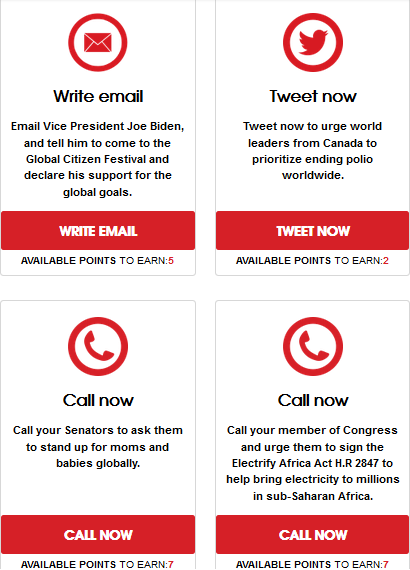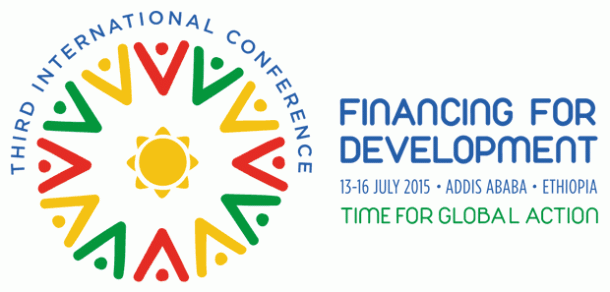by Alex Evans | Sep 15, 2015 | Economics and development, Influence and networks
Remember a time when people went out and joined hands in the streets to demonstrate their passion about the issues they cared most about? Well, forget all that sentimental crap and get with the 21st century, my friend. These days, it’s all about the NGO airmiles.
 This is an excerpt from the website of the Global Citizen Festival, next weekend’s jamboree in Central Park at which Coldplay, Beyonce, Ed Sheeran, and Pearl Jam will extol the virtues of the Sustainable Development Goals. Wondering how to get hold of a ticket? Answer: you have to go on an “Action Journey” (yes, really). Once you accumulate 65 points from taking actions like the ones above, presto! – you’re entered into the lottery for tickets.
This is an excerpt from the website of the Global Citizen Festival, next weekend’s jamboree in Central Park at which Coldplay, Beyonce, Ed Sheeran, and Pearl Jam will extol the virtues of the Sustainable Development Goals. Wondering how to get hold of a ticket? Answer: you have to go on an “Action Journey” (yes, really). Once you accumulate 65 points from taking actions like the ones above, presto! – you’re entered into the lottery for tickets.
Now, call me old fashioned, but isn’t the point of mobilising people for demonstrations to show politicians clearly that said demonstrators really care about the issue in question? True, that clarity may have got a bit blurred once demonstrations started turning into free U2 gigs like Live8. But that’s nothing to the mixed messages we’re sending politicians once they start to wonder if the people tweeting them about water and sanitation are actually just after free Beyonce tickets.
Worse than that, we’re also sending people the implicit but still unambiguous message that the SDGs aren’t worth caring about in and of themselves; that we understand that of course we’ll need to throw in some freebies in order to get you to give a shit about ending poverty by 2030, or bringing today’s levels of inequality under some kind of control, or ending violence against women and kids. Seriously? Is that really our model of activism?
by Alex Evans | Apr 24, 2015 | Economics and development, Influence and networks

A couple of weeks ago, preparations for July’s Financing For Development summit in Addis Ababa passed the 100 days to go mark. Unfortunately, the summit is at this point not on track to meet the high expectations for it. It faces a mutually reinforcing set of problems, including:
- Confusion about the summit’s intended outcomes – with too many issues on the table, and a serious lack of clarity about what success would look like on each;
- A lack of agenda setters – so far only the co-facilitators (Norway and Guyana) are really leading the process, but their room for manoeuvre is constrained by the need for them to remain neutral honest brokers; and
- Insufficient political will – the result of the summit not yet being on heads’ or finance ministers’ radars, as well as it not being a top 2015 priority for civil society.
So what would it take to turn things around and make Addis a success? One of the essentials is a clearer political narrative – one that explains what the summit is for, what’s new this time around (as compared to Monterrey in 2002 or Doha in 2007), what it could achieve, and why high level policymakers, and above all finance ministers, should make the effort to attend. This short note (pdf), produced with colleagues at the NYU Center on International Cooperation, is an attempt to start thinking this through over just a couple of pages – any feedback and suggestions for improvement gratefully received.
More broadly, we also need a harder-edged political strategy. This paper (pdf) – which was circulated earlier this month, and so doesn’t reflect last week’s FFD talks in New York or the IMF / World Bank Spring Meetings – sets out a few ideas. Again, feedback warmly welcome.
(And on the overall SDGs agenda, David Steven and I also just published the latest in our series of What Happens Now? papers taking stock of where the process stands and where it might go next – you can download that here.)
by Alex Evans | Sep 19, 2014 | Reports
Working draft of a paper by Alex Evans on potential elements of a global political deal on ‘means of implementation’ for the post-2015 development agenda (September 2014).
Download Full Report
by Alex Evans | Sep 19, 2014 | Climate and resource scarcity, Economics and development, Global system
The post-2015 agenda is at a turning point, with the intense discussions of the last year about Goals and targets giving way to a new focus on how the world will achieve the high ambitions set out in the draft Sustainable Development Goals.
Over the next eighteen months, we’ll see a veritable blizzard of summitry, including a critical OECD meeting looking at the definition of aid this December, a major summit on financing for development in Addis Ababa next July, the key final decision moment on the shape of the new Sustainable Development Goals in September 2015, a make-or-break climate summit and a WTO trade ministerial in December 2015, and high-potential summits of the G7/G8 in Germany, and the G20 in Turkey.
All of these moments have the potential to yield elements of a global political deal on ‘means of implementation’ for the post-2015 agenda. But what are the options for those elements – and which of them offer the highest potential in terms of development impact and political achievability?
These are the questions I address in a new paper, commissioned by the UN Foundation, and published today as a working draft ahead of next week’s UN General Assembly and climate summit, and in advance of a final version in October.
It includes both a 10 point ‘straw man’ package of measures on means of implementation that ranges from ODA, domestic resource mobilisation, and the role of the private sector through to trade, sustainability, and transparency; and a long-list of potential outcomes and asks – in each case with a brief discussion of the political and developmental pros and cons.
by Alex Evans | Sep 17, 2014 | Reports
Written evidence by Alex Evans and the Center for Global Development’s Owen Barder to the UK Parliament International Development Committee inquiry on the future of the Department for International Development and the ‘beyond aid’ agenda (September 2014).
Download Full Report
 This is an excerpt from the website of the Global Citizen Festival, next weekend’s jamboree in Central Park at which Coldplay, Beyonce, Ed Sheeran, and Pearl Jam will extol the virtues of the Sustainable Development Goals. Wondering how to get hold of a ticket? Answer: you have to go on an “Action Journey” (yes, really). Once you accumulate 65 points from taking actions like the ones above, presto! – you’re entered into the lottery for tickets.
This is an excerpt from the website of the Global Citizen Festival, next weekend’s jamboree in Central Park at which Coldplay, Beyonce, Ed Sheeran, and Pearl Jam will extol the virtues of the Sustainable Development Goals. Wondering how to get hold of a ticket? Answer: you have to go on an “Action Journey” (yes, really). Once you accumulate 65 points from taking actions like the ones above, presto! – you’re entered into the lottery for tickets.
